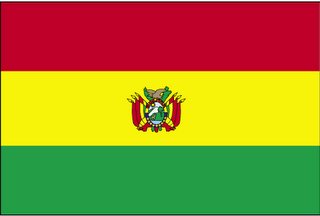Bolivia: Looking Forward
 Jan 27 - LA PAZ (digitalwarriormedia) - International observers are virtually unanimous on the conduct of Bolivia’s referendum vote on Sunday, which went smoothly and without any violence.
Jan 27 - LA PAZ (digitalwarriormedia) - International observers are virtually unanimous on the conduct of Bolivia’s referendum vote on Sunday, which went smoothly and without any violence.“We did not see any irregularities that could affect the outcome of the vote.” said Dr. Jennifer McCoy, Director of the Americas program at the Carter Center during a press conference on Tuesday. “This is a very important, democratic experiment for all of the Hemisphere to watch.”
As a special envoy for President Jimmy Carter, Dr. McCoy supervised a mission that sent observers into both rural and urban areas in the departments of La Paz, Santa Cruz and Tarija.
The Carter Center was one of several international agencies that arrived in Bolivia at the behest of the Bolivian government to observe and report on the referendum voting process.
Calls of fraud on the part of the opposition have been virtually quelled by reports issued from the Organization of American States (OAS), Union of South American Nations (UNASUR), the Carter Center, Southern Common Market (Mercosur) and the European Union.
About 300 observers attended the vote, which National Electoral Court President Jose Luis Exeni said was “the greatest presence of international observers in Bolivia’s democratic history.”

With almost 87% of the votes counted as of Tuesday evening – 100% from the departments of Pando, Beni and Cochabamba – the numbers demonstrate that the 60-40 victory called early on January 25 is secure.
Moving Forward
The opposition prefects of the eastern lowland departments of Beni, Pando, Tarija, Santa Cruz and Chuquisaca note that the 60% approval of the constitution indicates Morales has lost support since winning a national recall referendum by 67% in August of last year.
It has emboldened the opposition leadership to say it is necessary for the central government to work with the departmental leadership to avoid polarizing the country.
Initial reports indicate that Morales has rejected calls by the opposition prefects to reach a pact between their departments and the central government. Morales has said that his priority is to implement the constitution as it stands.
For 12 hours on Tuesday, Morales, cabinet members, and some social movement leaders met in Huajchilla - about 7.5 miles outside of the center city of La Paz –to lay out a strategy for implementing the new Political Constitution of the State (CPE).
According to Minster of State Recuperation Hector Arce, "All agreements have to be established, through the New Constitution, which wasn’t approved by Congress, or any assembly, but by the Bolivian people, and our Government has to respect responsibly this decision.
The OAS and European Union have called on both sides to reach an agreement of compromise. Stalemates between both sides over the drafting of the constitution led to violence that left several dead since the Constituent Assembly convened in August 2006.
"I appeal to all parties," said European Commissioner for External Relations, Benita Ferrero-Waldner, "for dialogue and to build consensus for the development of the country."
In the days leading up to the referendum vote Morales and his supporters have stressed the importance of improving Bolivia for the majority of its diverse population. They have called for peace and a desire for the ongoing change taking place in the country. Regardless of the margin of victory in this vote in comparison to the approval vote for Morales to stay in office last year, 60 percent of the Bolivian people have spoken and that is the decision that should be respected.
Photos: Digtal Warrior Media
Labels: karah woodward Bolivia Carter Center Jennifer McCoy international observers referendum constitution

















 The results look similar to President Evo Morales’ margin of victory in a
The results look similar to President Evo Morales’ margin of victory in a 







